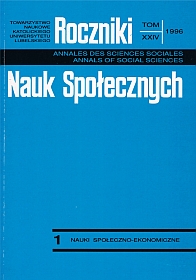Proces profesjonalizacji nauki. Blaski i cienie; zagrożenia i problemy
Abstrakt
Scientific activity, similarly as other kinds of human activity, undergoes transformation into occupational activities. Thus understood process of professionalization bears a multifaceted character. It embraces the institutionalization of scientific activity, that is its evolution from a disinterested teaching carried out by individual philosophers to formally organized research institutes, employing specialized teams, learned societies, universities and academies of science. Knowledge and teaching, as carried out voluntarily and privately by philosophers, become an important and social useful sphere of activity supported and regulated by the state. Knowledge and teaching are in the service to the practice and its needs. As early as the end of the 19th century, and in particular in the 20th century, a research worker found himself under the discipline of a formal structure of an institute, clinic, and university. The pursuing of science became etatist and was brought within the framework of a formalized and bureaucratic organization. The forme philosopher, or later scholar, became a hired, full-time employee and officer of science.
The second aspect of the professionalization of science is the division of science in general into particular sciences and fragmentation of each science of a given kind into particular scientific disciplines; thus we have the phenomenon of autonomism of particular scientific disciplines. That process causes an enormous extension and deepening of knowledge, but it also means that the relationships between particular scientific disciplines and the respective fields of reality they study have been broken.
The third aspect of the professionalization of science constitutes the phenomenon of differentiation as regards the categories of research workers, and the formation of different social roles that they fulfil. We may distinguish six social roles which have been clearly manifested. In other words, these are occupational groups of research workers: founders of science, erudite persons - critically recreative research workers, experts, counsellors, implementors, and technical workers of science. It is characteristic of science that inasmuch as particular social role of research workers are well-defined, the legal and occupational status of the people of science is, generally, not defined.
Bibliografia
Durkheim E.: De la division du travail social
Bernal J. D.: Rola nauki w dziejach. Warszawa 1967;
Uklejsk a M.: Zarys rozwoju nauki i jej organizacji. Cz. 1-2. Warszawa 1963;
Crombie A. C.: Nauka średniowiecza i początki nauki nowożytnej. Warszawa 1960;
Amsterdamsk i S.: Tendencje rozwoju nauki w II połowie XIX wieku. W: Historia nauki polskiej. Pod red. B. Suchodolskiego. T. IV za lata 1863-1918, cz. III, 1987 r. s. 7-38.
Kamiński S.: Pojęcie nauki i klasyfikacja nauk. Lublin 1981;
Etyka zawodowa ludzi nauki. Pod. red. J. Goćkowskiego i K. Pigonia. Wrocław 1991 (artykuły T. Łepkowskiego, J. Szczepańskiego, J. Kulpińskiej i innych);
Rudniański J.: Nauka: twórczość i organizacja Warszawa 1976;
Crombie A.: Scientific Change. London 1963;
Znaniecki F.: Społeczne role uczonych. Warszawa 1984;
Jaroszyńsk i M.: Prawo pracowników nauki. Wrocław 1971.
Copyright (c) 1996 Roczniki Nauk Społecznych

Utwór dostępny jest na licencji Creative Commons Uznanie autorstwa – Użycie niekomercyjne – Bez utworów zależnych 4.0 Międzynarodowe.


